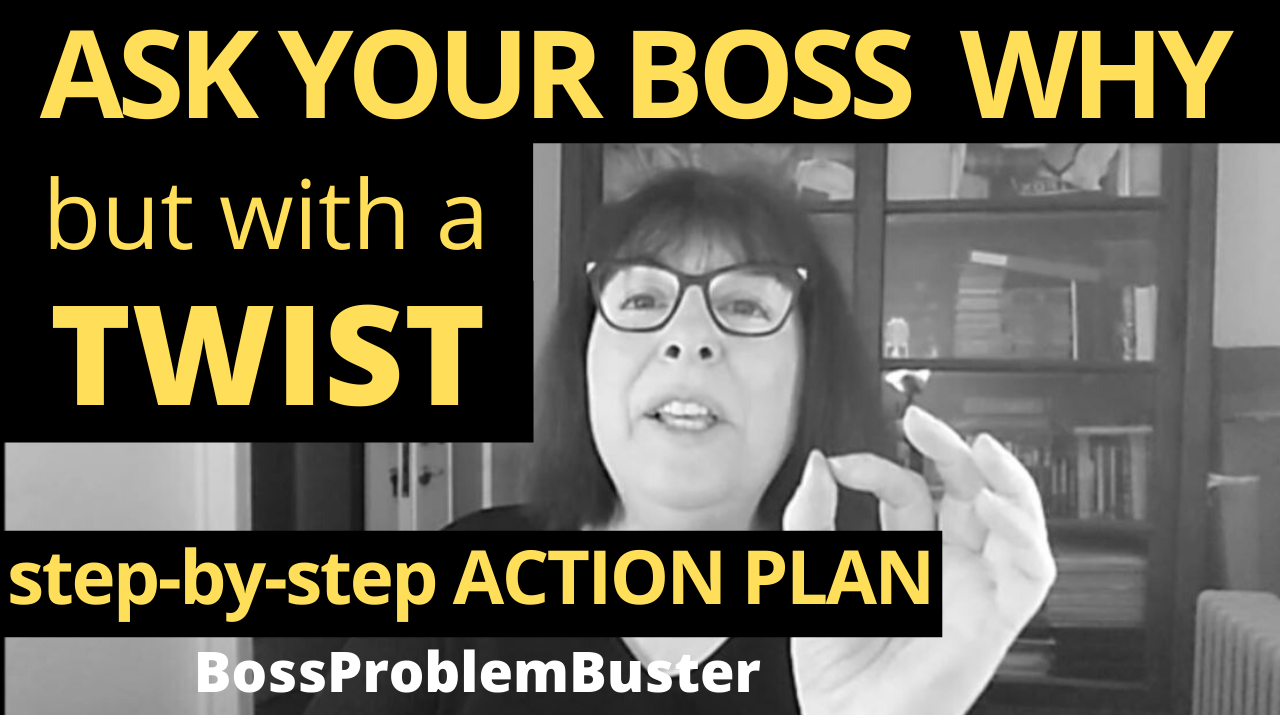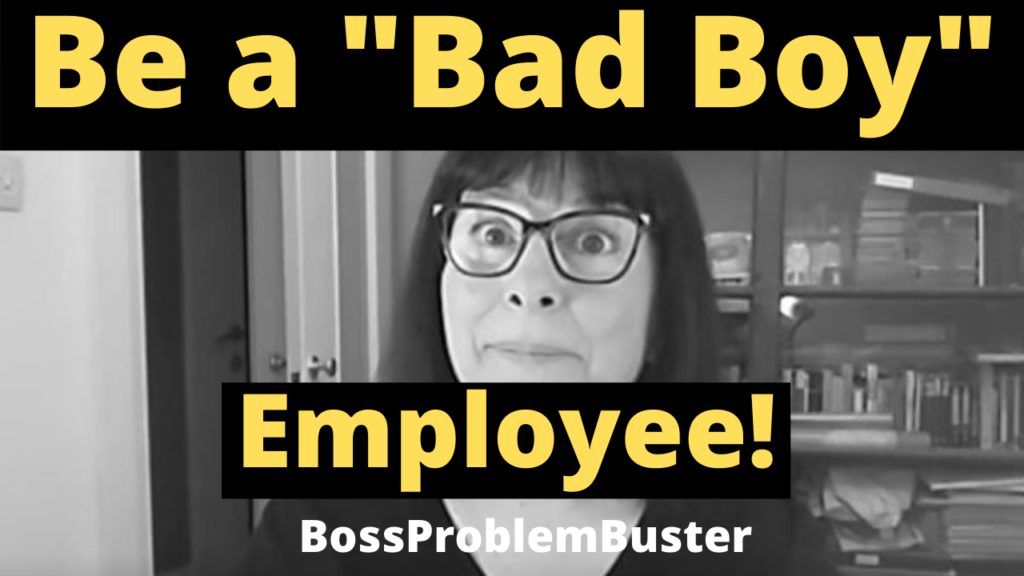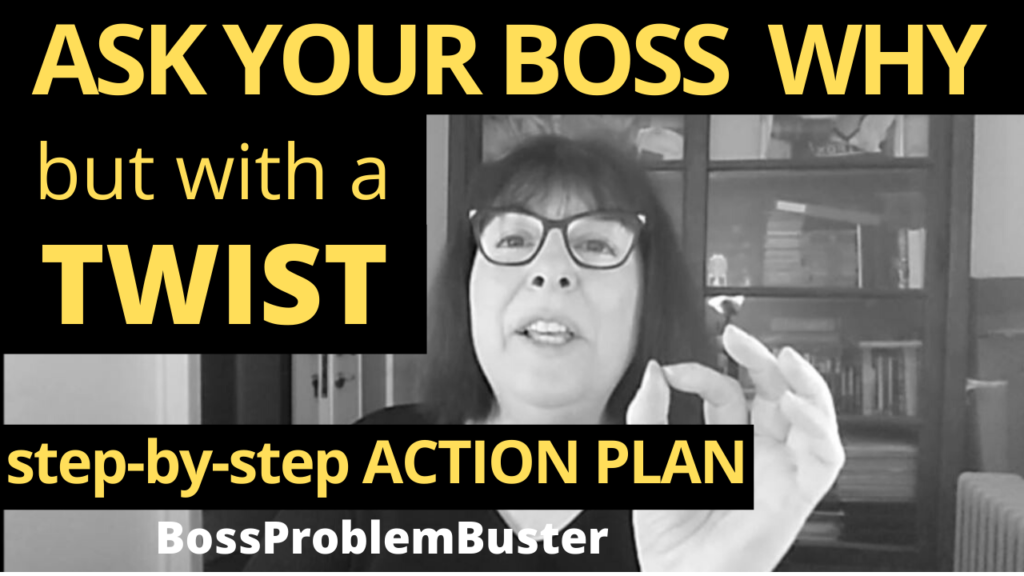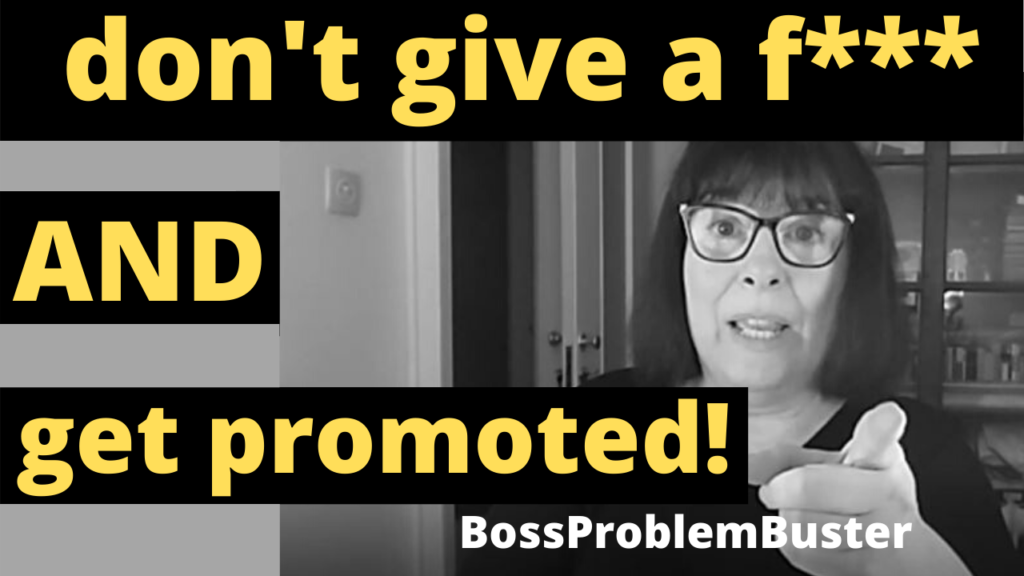part 5 of 6
Passed Over
For a Promotion
& Pay Raise:
What To Do
(and Not Do)
Right After
The Ultimate Guide

Your Emergency Snub Stack
let's bring YOUR inner joy back!
We’ll bust our asses for you
(some free some paid)
but you have to make the first move:
Put in your most frequently monitored email, NOW
and get us on you’re side!
(no, no freebie – you don’t need a bribe – you need results!)
part 5 of 6
Ask Your Boss Why
But With a TWIST!
TLDR
(you’re welcome!)
a. YOU give your boss feedback
(not the other way around)
EXACT STEPS (13)
b. Start your campaign for next time
watch / read to find out how
don't expect to get real feedback!
it is not the goal!
Passed Over for Promotion & Pay Raise:
What To Do (and Not Do)
Right After
to Get Another Shot
The Ultimate Guide
Ask Your Boss Why
But With a TWIST!
Stake Your Claim: a Step-By-Step Action Plan
Are you self-sabotaging?
Are you ambivalent and conflicted about that promotion?
A part of you really wants it, because of the:
– acknowledgement of your contribution
– because of having more power to do things your way
– because of the prestige that comes with higher ranking titles of the organizational ladder
– and of course that pay raise – who wouldn’t want that?
But then on the other side:
– who wants that extra hassle
– who wants to deal with difficult team members
– who wants to be between a rock and hard place, which is the lot of any manager, especially mid-management level, which probably where you already are, or desiring to be,
plus
– the longer hours…
not that you are slacking now, but still, you’d have to set an example for everybody else… that sounds very nice in theory, but in practice it is extremely destructive to one’s personal life…
So many pros and cons… Are you sure you’re settled on the pros? We’ll find out in a moment, PLUS: the daunting task of asking your boss for feedback – but with a twist, that would surprise you! So, lot’s to do! first some context:
Don’t watch / read this if you haven’t watched / read the previous parts -this will be of no use to you otherwise: it’s almost like math (sorry to bring up potential bad memories – many people have issues with math, me included), but it IS like math in that, one thing leads to the next, and builds on the previous: you need to build it step-by-step
in order to fully GRASP it, and INTERNALIZE it, so that you can ORGANICALLY act on it, meaning naturally, as if it has always been an integral part your personality, which is why I stress it so.
OK, now that we’ve laid the foundations for the best practices right after being passed over for a promotion or pay raise or both, i.e. you:
(1) understood your boss’ psychology
(2) figured out why “good boys” always finish last, so you have to be a “bad boy” employee and also
(3) how to do the “bad boy” employee mentality just right
and you’ve started to implement this newfound knowledge with:
(4) express your distress
and
(5) assert yourself to your boss and colleagues alike, with a five steps sequence and an exact script that we’ve gone over together,
Now we come to the last stretch of those eighth DOs (what TO DO) right after being passed over, which means it’s time to put it all together, in order to be able to move ahead.
The no. 6 DO right after being passed over for a promotion or a pay raise or both is:
- Check your attitude (not the one you think – another one): Do you really want it (the promotion)? Are you self-sabotaging?
Are you ambivalent about getting that promotion? Nobody can be ambivalent regarding a pay raise, but the promotion – that’s different: yeah the title is nice – the higher the title is on the organizational hierarchy, the most prestigious it is. It boost your ego, it creates a bit of a power dynamics, that tilts your way, even if implicit, with everybody around you + it easily seeps into you’re out-of-work life: getting a date as a manager, is easier then as an entry level, junior, run-of-the-mill, rank-and-file, employee, (at least for men),
so that’s another pro.
But with this mix of pros and cons, you have to make sure you really want it – and if not, that’s absolutely fine!
(I will do a deep dive into that in the future, because there are many people who are pressured, implicitly or explicitly, by their peers, their family, their friends, or just the omnipresent culture of vertical achievement, that is the supposed epitome of corporate success, and note I say “supposed” because it really doesn’t have to be. Let me know if this is something you would be interested in, so that I know what priority to assign it).
So, if you DON’T really want a promotion, and you’re doing it just because you think you should be doing it, two things will happen:
(a) your ambivalence will be apparent to everybody around you, your boss, especially, will know you’re just going through the motions, so… faking it! Because people who really want a promotion, who have that fire in them, that very specific kind of drive – it really shows, and in contrast, it’s very clear when somebody does not have it.
(b) if you happen to get that promotion you didn’t really want (and this can happen sometimes when the position needs to be filled urgently, and there are no other compatible candidates other than you), you are going to be both miserable and an underperformer. You’re just not going to be successful, and you might even get fired, the moment they can find someone to replace you, which they will be looking for frantically, the moment they realize you suck! So… not a good idea…
Which is why you really must be honest with yourself, and with your boss, as to whether a promotion is something you truly desire, and can produce results for both you and the company.
There are other ways to get a pay raise. It doesn’t necessarily has to be vertical promotion. I’ll do a whole other post on that in the future – let me know if you’re interested.
By the way: the steps are numbered because their order is sequential by design, and not arbitrary – there’s an evolution within it, thus dos 1-3 must be in order, 4 and 5 are concurrent, and then, back in sequential order. But depending on different circumstances, they might be implemented in a different order. So, execute them in the order I’m presenting them – i.e., the order that corresponds with their number.
The no. 7 DO (what TO DO) – and second to last – right after being passed over for a promotion, or a pay raise, or both, is:
- Ask your boss for a feedback – but with a twist!
Which is:
don’t expect to get a real one! Instead, your goal with this feedback is quite the reverse, as we’ll explore in a moment.
But first, we need to get rid of a preliminary problem, which is probably the fact that, the mere suggestion of asking your boss for a feedback, is probably giving you the shivers…
You may be thinking: “you want me to do what? Ask for feedback and without even expecting to get a real one? So why even bother? It’s not like it’s fun for me, going into my boss’s office, asking for a one-on-one meeting in these circumstances of just being passed over by this very same boss…”
I soooo hear you. I would have said the same if i were you, and remember: I’m on your side! I have a plan: the goal of such a meeting is completely different! Hear it out!
You’re in a state of shock, and are not sure as to what to do next, or where to go from here (which is why you’re here, on our website: TO know). So, if you’re like most people in this kind of inner turmoil, you would tend not to challenge the boss, on his or her decision to pass you over, thinking “what is there to say? The boss has spoken loud and clear, through his or her decision not to promote me. Why do you want me to go through this yet another humiliation, by asking for a feedback? I got the feedback: I was tossed aside! That’s all the feedback i need, thank you very much!”
Again I totally hear you, and again: I’m on your side, and you promised to hear me out. I’m not done yet!
Listen, this feedback-with-a-twist, ties in perfectly to what we’ve talked about why you should be a “bad boy” employee, and how to do it right. Remember the paradox of the “good boy”, and the “bad boy”, we’ve expanded on, through the analogy to the parents and kids?
Well it all comes together now [I love it when a plan comes together]: this lack of challenge from you to your boss, means that you are condemning yourself to be relegated, by him, to the “good boy” employee status, which is completely counterproductive to your end goal, which is never ever being passed over again, which means, come next opportunity, that promotion and/or pay raise, must be in the bag! Your bag!
Therefore, you can’t afford to be tagged, in your boss’ mind, as a “good boy” employee, because, as you know by now, this would mean you are doomed. You’re not getting that next promotion and/or pay raise, because there will always be some “bad boy” employee, asserting themselves to your boss, in a consistent and unrelenting manner, until they get it. And when they do guess who gets screwed over again?!
(This tagging process, in your boss’s mind, is subconscious, which makes it even more dangerous to you).
And if you’re willing to let this happen, after everything you’ve been through with that workplace snub that you got: what have we been doing here for the last 2-3-4 posts of this masterclass? Have you heard nothing I’ve said?
Look, it is your prerogative. I’m telling you how to win, but if you don’t want it badly enough, to be bothered going outside of your comfort zone, by initiating a one-on-one with your boss, then maybe you should go back and check the previous DO (do no. 6), about a potential ambivalence you may have, regarding truly wanting that promotion…
But for those of you who are with me, who are not ambivalent, who are not bowing out, who want to go for the win, I’m here for you, so let’s move on!
A quick reminder: this DO (no. 7 out of 8) is: ask your boss for a feedback – but with a twist, and it’s time to reveal the full twist. It is a two-fold twist:
(a) ask for feedback without expecting to get a real feedback – I’ve already mentioned this part above, and here comes the big reveal – drum roll please –
(b) your goal is not for your boss to give you feedback, BUT FOR YOU TO GIVE YOUR BOSS FEEDBACK! Let me explain what I mean.
Your goal is to be tagged (consciously and/or subconsciously), in your boss’s mind, as a “bad boy” employee, thus, one whom must be appeased to keep the industrial peace the team, and the department as a whole.
You do that by implementing the amalgamation of everything we’ve covered
which – all put together – is now your SUPERPOWER! Let me prove it to you:
(I’m building your confidence to do this, you know that right)
You have the effective mental infrastructure we’ve laid in the first 3 Dos:
- Understand your boss’ psychology and how it can work to your advantage
2. Be a “bad boy” employee
3. Getting the “bad boy” employee mentality right
Then you have the tools for implementation with DOs number 4+5:
Express Your Distress, and Assert yourself – to your boss and colleagues alike, respectively.
On top of all that, you have DO no. 6, we’ve just covered, of checking your attitude regarding promotion, to make sure you really want it, and you’re not self-sabotaging.
So… you can absolutely do it! You have everything you need to do this no. 7 DO, of asking your boss for feedback but with a Twist!
So, all this iteration of your superpower was to convince you, you can actually do it! Hopefully, I’ve managed to do it, and now I’ll show you exactly HOW.
Here is the precise sequence you need to execute, as soon as possible:
(there are 13 – I know it sounds like a lot, but it’s very organic in nature, as you’ll see. I just wanted to break it down for you, in a detailed a manner as possible, so that you would have a step-by-step action plan, to embolden you to execute, by making it clearly drawn out for you).
- Step into your boss’s office, and set up a one-on-one meeting in the very near future, as in today, tomorrow, another time this week, next week tops!
- If your boss inquires as to what’s the urgency, and what it’s about – have this come back ready to shoot out: “it’s in regard to you passing me over, and it’s urgent for obvious reasons”.
Make sure you speak in a very respectful and non-combative manner: you’re not there burn the bridges – you there to make your stance known.
Note this perfectly implements the “bad boy” mentality, in both the “what” and the “how”:
- The “what”
Going in there, requesting a meeting – that’s already asserting yourself!
Then, the addition of “it’s urgent for obvious reasons” is pure “bad boy”, because you are not saying anything regarding your plans for the future (which, just between the two of us, you are not sure of yourself), but you are making it clear that you are weighing your situation, post being passed over, and that you’re not taking it lying down.
BUT… careful! Don’t overdo it! Be sure to remember, and implement, the DON’Ts we’ve covered before, of what NOT to do right after being passed over, two of which are pertinent here: do not leave, and do not or threaten to leave.
- The “how”
Note the respectful, non-combative manor, which should always be present when communicating with your boss.
Also, remember another crucial DON’T: don’t be passive-aggressive, in any way, shape or form.
OK, step no. 3 in this sequence:
- Do your homework: prepare yourself for the meeting, as if for a performance review.
The “what” here is:
Make a case for why you deserved that promotion, and or pay raise: your unique contribution to relevant metrics of the department’s success (which is of course your boss’s success).
The “how” here is: be concise and factual – not emotional, and by ’emotional’ I mean no overt displays of emotions, other than some natural distress, as is expected in your situation, as we’ve discussed before. So… No whining of any sort, please, and for sure [ladies listen up]: ABSOLUTELY NO CRYING!
- Update colleagues, that are bound to see you going into the meeting, about it, ahead of time, and right after, so that you can be “ahead of the story” is it called in PR (public relations), meaning you proactively move the narrative, i.e. you are taking control over what they think is going on with you and your boss, rather than allowing the Grapevine to circulate unsubstantiated rumors, that may not serve you.
Don’t go into details of what you’re going to say, nor afterwards, of what your boss said exactly. Why? 3 reasons:
- It’s none of that business!
- You don’t want to commit yourself one way or the other, because you don’t know how it’s going to play out exactly, and you don’t want to make an idiot out of yourself, by going in with a bang and coming out with a whimper.
Unless of course we’re talking about colleagues who are real friends, in which case, by all means, share everything you feel comfortable sharing.
- Regarding the “after” (what you share with your colleagues after the meeting with your boss):
You need to be careful about what you share, because you need to be discreet:
You don’t want your boss to think you’re a “kiss and tell” kind of guy or gal [and surely you understand, I’m using this idiom figuratively only].
The meeting itself:
- Be sure you have the door closed, for privacy, and your phone turned off, for obvious reasons.
- Start with a statements regarding how disappointed, and surprised, and upset you were, to find out you were passed over. Take a breath and see if your boss reacts to this declaration. If so – listen carefully to what is being said. It’s not – go on to the next step.
- Ask directly: “why not me???”
Say it without stuttering, without flinching, and without fidgeting – just look him straight in the eye, and say it!
Do not express it in a tone of blame, but inquiry: you really want to know, why not you.
Then pause and wait for the answer to come.
- If the answer is, as probability suggest, meaning some b**s**** sweet-talking gibberish of how difficult it was to choose between you and the other guy or girl, how wonderful you are blah blah, and/or trying to divert from directly addressing the issue, to blaming outside pressures from superiors – whatever it is: address it accordingly.
Don’t be afraid to show you don’t buy it, or you disagree, or you accept – all depending on what is being said. To do that, you must make sure you are truly truly listening.
As I said previously on this series, most bosses are not true leaders, but more of some administrative bureaucrats, whom are, more likely than not, to be wimps when confronted directly, as you are doing now (though of course you are being respectful as we’ve said).
However, should your boss turn out to be the exception – that would be wonderful, although more difficult for you. Why?
Well, ‘wonderful’ because you will get the truth, and that will enable you best course correct – you’ll know what is hampering you from getting that promotion, and or pay raise. And ‘difficult’ because, as Jack Nicholson’s character in a Few Good Men said: “you can’t handle the truth!” Most people can’t. Make sure you can. Is the key to success.
- In either case (whether your boss gives you concrete answers, or b******* answers) state clearly, and directly, and concisely, that you really really want that promotion, and or pay raise, and then ask:
- “What do I have to do, to get it the next time around?”
if you do it sincerely and respectfully, it’ll give your boss an opportunity to be a guide or mentor to you, which he or she may like, and in any case, will set you on a positive and constructive new relationship, where your boss feels respected, and looked up to, by you –
which is a good thing to have, in a delicate balance with the “bad boy” employee mentality – this delicate dance between the two should be the core of your relationship. - Ask when the next opportunity will come to pass. As I’ve explained in a previous post, your boss probably doesn’t know, and cannot commit to a specific time frame, at this time,
but, you’re asking, is yet another signal for him or her, that you mean business!
Then, to sum up (note you are respectfully taking charge of the meeting, and moving it ahead):
- Declare you’re going to do everything your boss said (in regards to how you can get that promotion, and or pay raise, come next time), and you trust that you won’t be passed over again.
Be sure to end with an upbeat note and show your optimistic for the future and you are going to work even harder (we’ve talked about this precise wording before).
- Suggest, and get your boss’ approval, to have another meeting like this, in three months’ time, to see if, and make sure that, you’re on the right course by that time –
no boss can disagree to that!
Once you’ve completed this sequence of total 13 steps, you have successfully implemented everything we’ve talked about, but one, which is a game changer that will help us conclude this series with a BANG: I’ll show you how not to give a f*** AND get your way (but in a good way). Coming up next!re
Get notified
so that you can bring YOUR
inner joy back!
when a new video / post is uploaded
(not too often, just right)
you’ll get the link delivered to your email
so that you don’t miss on the insights and tools
that can kill your Monday blues once and for all!
So if you’re serious about getting YOUR inner joy back –
Put in your most frequently monitored email, now:






